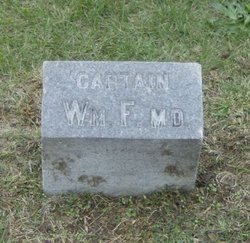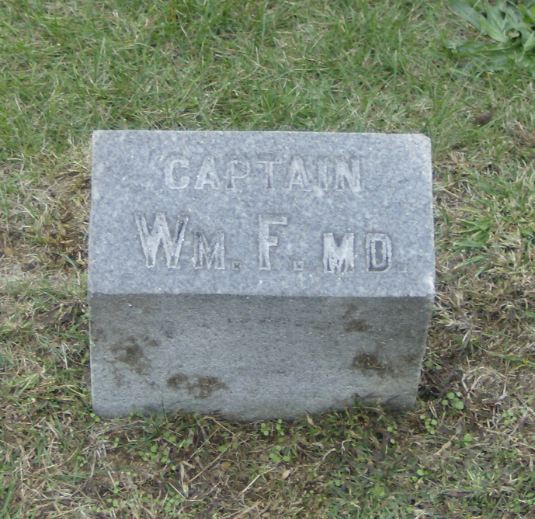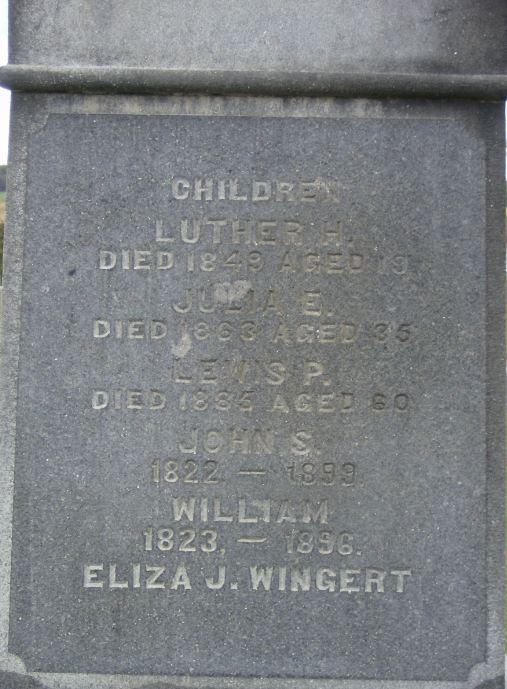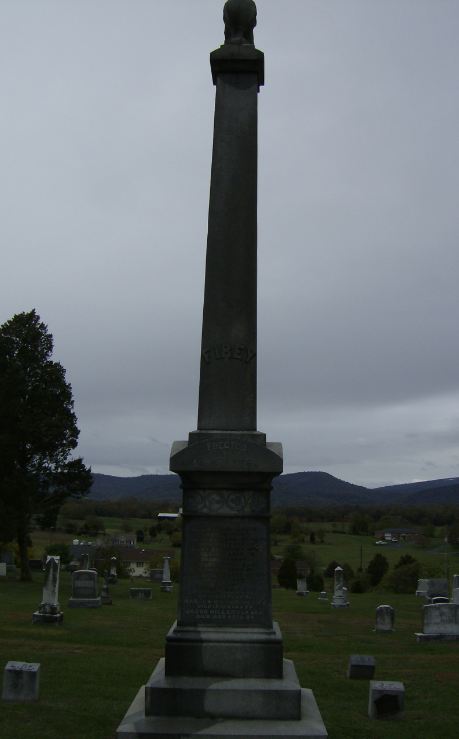Marshall College [while at Mercersburg, Pa., later Franklin & Marshall College, Lancaster, Pa], Class of 1843
William FIREY, A. M., M. D., was a son of Henry and Martha (Miller) Firey. He was born at the Firey homestead at St. Paul's Reformed church, near Clearspring [Clear Spring], Md., December 16, 1823. He prepared for college at Hagerstown and entered the Junior class in 1841. At graduation he took the honor for proficiency in Latin. He was a member of the Diagnothian Literary Society.
After leaving college he studied medicine and graduated from the Medical Department of the University of Pennsylvania, April 3, 1847. For a time he was principal of the high school in Springfield, Ill., and later practiced his profession in St. Louis, Mo. From here, in 1849, he went overland with an ox-team to California, and engaged in gold mining with considerable profit. He returned home in 1853, took another course of lectures in medicine in Philadelphia, and then opened an office in Clearspring [Clear Spring]. He was quiet and unpretentious in manner and of a kind and obliging disposition, so that the patient felt he was a friend as well as physician. He had a large and profitable practice.
At the outbreak of the Civil War, in the spring of 1861, he recruited a force of cavalry, and was commissioned captain of the company, which was at once mustered into the service of the United States as Company B, 2d [actually 1st, not 2nd] Regiment, Maryland Cavalry. He went into camp at Frederick, Md., for drill and preparation for active service in the field. He was called into action in West Virginia and Maryland to repel an invasion, and was in several engagements at this time.
The company was especially serviceable to the army on the retreat of Banks. When Lee invaded Pennsylvania in 1863 Captain Firey burned the bridge over the Potomac at Falling Waters, thereby harassing and delaying the retreat of the Southern army to Virginia. He had many most exciting adventures. During one of the periodical raids of the rebel army down the Shenandoah Valley, before the advent of Sheridan, Captain Firey's company was driven before the enemy and the Captain received a severe wound in the head. He fell from his horse unconscious and was left on the field for dead, and thus escaped being taken prisoner. He soon recovered sufficient strength to make his way into the lines of the National army.
Owing to his injury, Captain Firey never resumed the practice of medicine, but spent his last years in other pursuits. For a time he was engaged in farming on the old homestead near Clearspring [Clear Spring]. In 1884 he visited California and the scenes of his mining ventures, and then returned to Topeka, Kansas, where he had large real estate interests. He died of paralysis, in Topeka, April 6, 1896, and is buried in St. Paul's cemetery, near Clearspring [Clear Spring].
Captain Firey was a man of most positive character, and always a leader of advanced public sentiment in his community. [Source]
Marshall College [while at Mercersburg, Pa., later Franklin & Marshall College, Lancaster, Pa], Class of 1843
William FIREY, A. M., M. D., was a son of Henry and Martha (Miller) Firey. He was born at the Firey homestead at St. Paul's Reformed church, near Clearspring [Clear Spring], Md., December 16, 1823. He prepared for college at Hagerstown and entered the Junior class in 1841. At graduation he took the honor for proficiency in Latin. He was a member of the Diagnothian Literary Society.
After leaving college he studied medicine and graduated from the Medical Department of the University of Pennsylvania, April 3, 1847. For a time he was principal of the high school in Springfield, Ill., and later practiced his profession in St. Louis, Mo. From here, in 1849, he went overland with an ox-team to California, and engaged in gold mining with considerable profit. He returned home in 1853, took another course of lectures in medicine in Philadelphia, and then opened an office in Clearspring [Clear Spring]. He was quiet and unpretentious in manner and of a kind and obliging disposition, so that the patient felt he was a friend as well as physician. He had a large and profitable practice.
At the outbreak of the Civil War, in the spring of 1861, he recruited a force of cavalry, and was commissioned captain of the company, which was at once mustered into the service of the United States as Company B, 2d [actually 1st, not 2nd] Regiment, Maryland Cavalry. He went into camp at Frederick, Md., for drill and preparation for active service in the field. He was called into action in West Virginia and Maryland to repel an invasion, and was in several engagements at this time.
The company was especially serviceable to the army on the retreat of Banks. When Lee invaded Pennsylvania in 1863 Captain Firey burned the bridge over the Potomac at Falling Waters, thereby harassing and delaying the retreat of the Southern army to Virginia. He had many most exciting adventures. During one of the periodical raids of the rebel army down the Shenandoah Valley, before the advent of Sheridan, Captain Firey's company was driven before the enemy and the Captain received a severe wound in the head. He fell from his horse unconscious and was left on the field for dead, and thus escaped being taken prisoner. He soon recovered sufficient strength to make his way into the lines of the National army.
Owing to his injury, Captain Firey never resumed the practice of medicine, but spent his last years in other pursuits. For a time he was engaged in farming on the old homestead near Clearspring [Clear Spring]. In 1884 he visited California and the scenes of his mining ventures, and then returned to Topeka, Kansas, where he had large real estate interests. He died of paralysis, in Topeka, April 6, 1896, and is buried in St. Paul's cemetery, near Clearspring [Clear Spring].
Captain Firey was a man of most positive character, and always a leader of advanced public sentiment in his community. [Source]
Family Members
Advertisement
Explore more
Sponsored by Ancestry
Advertisement












